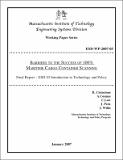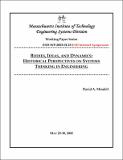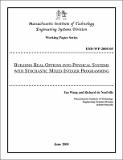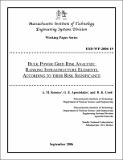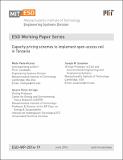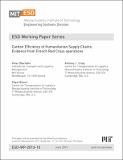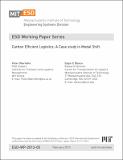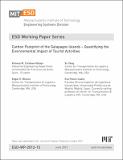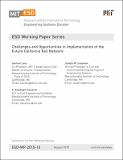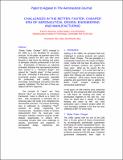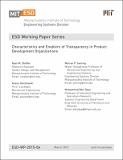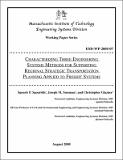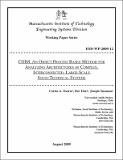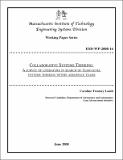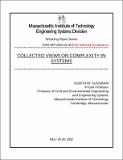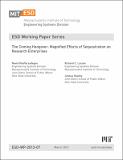Browsing Engineering Systems Division (ESD) Working Paper Series by Title
Now showing items 27-46 of 273
-
Barriers to the Success of 100% Maritime Cargo Container Scanning
(Massachusetts Institute of Technology. Engineering Systems Division, 2007-01)The attacks of September 11, 2001 revealed national security vulnerabilities that had previously not received high level priority in the United States, such as insecure transportation and infrastructure networks. In response, ... -
Bits and Bucks: Modeling complex systems by information flow
(Massachusetts Institute of Technology. Engineering Systems Division, 2002-05)This paper presents a general method for modeling and characterizing complex systems in terms of flows of information together with flows of conserved or quasi-conserved quantities such as energy or money. Using mathematical ... -
Bodies, Ideas, and Dynamics: Historical Perspectives on Systems Thinking in Engineering
(Massachusetts Institute of Technology. Engineering Systems Division, 2002-05)Today, the idea that technology consists not simply of individual machines but of systems of components and interconnections underlies much of engineering theory and practice. Yet this idea is relatively new in the history ... -
Building Real Options into Physical Systems with Stochastic Mixed-Integer Programming
(Massachusetts Institute of Technology. Engineering Systems Division, 2005-06)The problem of building real options into physical systems has three features: real options are not as easily defined as financial options; path-dependency and interdependencies among projects mean that the standard tools ... -
Bulk Power Grid Risk Analysis: Ranking Infrastructure Elements According to their Risk Significance
(Massachusetts Institute of Technology. Engineering Systems Division, 2006-09)Disruptions in the bulk power grid can result in very diverse consequences that include economic, social, physical, and psychological impacts. In addition, power outages do not affect all end-users of the system in the ... -
Capacity pricing schemes to implement open-access rail in Tanzania
(Massachusetts Institute of Technology. Engineering Systems Division, 2014-06)We analyze alternative capacity pricing schemes (access charges) to implement an open-access railway system in Tanzania. We show that the implementation of variable access charges widely used in the railway industry may ... -
Carbon Efficiency of Humanitarian Supply Chains: Evidence from French Red Cross operations
(Massachusetts Institute of Technology. Engineering Systems Division, 2013-06)Natural catastrophes are often amplified by man-made impact on the environment. Sustainability is identified as a major gap in humanitarian logistics research literature. Although humanitarian supply chains are designed ... -
Carbon Efficient Logistics: A Case study in Modal Shift
(Massachusetts Institute of Technology. Engineering Systems Division, 2013-02)Corporate sustainability is becoming increasingly important in the development of business strategies. Consequently, transport and logistics operations come under particular scrutiny due to their substantial impact on the ... -
Carbon Footprint of the Galapagos Islands – Quantifying the Environmental Impact of Tourist Activities
(Massachusetts Institute of Technology. Engineering Systems Division, 2012-06)The main goal of this paper is to quantify the green house gas emissions (also referred to as carbon footprint) of the Galapagos Islands. The analysis includes emissions from energy generation and of related economic ... -
Challenges and Opportunities in Implementation of the Future California Rail Network
(Massachusetts Institute of Technology. Engineering Systems Division, 2015-08)The California High-Speed Rail Authority (CHSRA) adopted a "blended system" at the northern and southern termini of the planned first phase of its high-speed rail line. In this blended operation, the high-speed rail line ... -
Challenges in the Better, Faster, Cheaper Era of Aeronautical Design, Engineering and Manufacturing
“Better, Faster, Cheaper” (BFC) emerged in the 1990s as a new paradigm for aerospace products. In this paper, we examine some of the underlying reasons for BFC and offer some thoughts to help frame the thinking and action ... -
Characteristics and Enablers of Transparency in Product Development Organizations
(Massachusetts Institute of Technology. Engineering Systems Division, 2015-01-04)Risks in product development lead to schedule and cost overruns and poor product quality. While many risk management frameworks have been published and research on specific practices has been conducted, little is understood ... -
Characterizing Three Engineering Systems Methods for Supporting Regional Strategic Transportation Planning Applied to Freight Systems
(Massachusetts Institute of Technology. Engineering Systems Division, 2005-08)A systems perspective for regional strategic transportation planning (RSTP) for freight movements involves an understanding of Supply Chain Management (SCM). This paper starts from the premise that the public sector needs ... -
A Classification of Uncertainty for Early Product and System Design
(Massachusetts Institute of Technology. Engineering Systems Division, 2007-02)Complex systems and products evolve over years to meet new requirements, while applying tried and tested technology. To maximise the reuse of components through the life span, companies need to plan for the changes that ... -
COIM: An Object-Process Based Method for Analyzing Architectures of Complex, Interconnected, Large-Scale Socio-Technical Systems
(Massachusetts Institute of Technology. Engineering Systems Division, 2009-08)There is growing evidence of the relevance of human behavioral factors in the success of development of new products, processes and services. The evidence is even clearer when the forces affecting the development and ... -
Collaborative Systems Thinking: A survey of literature in search of team-level systems thinking within aerospace teams
(Massachusetts Institute of Technology. Engineering Systems Division, 2008-06)This literature review was prepared in support of research investigating team-level systems thinking. Three critical constructs were identified-team, process, and culture-and the pertinent literature is explored in this ... -
Collected Views on Complexity in Systems
(Massachusetts Institute of Technology. Engineering Systems Division, 2002-05)The term complexity is used in many different ways in the systems domain. The different uses of this term may depend upon the kind of system being characterized, or perhaps the disciplinary perspective being brought to ... -
Combating System-Level Quality Problems in Complex Product Development
(Massachusetts Institute of Technology. Engineering Systems Division, 2007-02)As products become more complex and their development involves more technologies, people, and companies, it is no longer sufficient to ensure that each part, component, or subsystem is designed and made correctly. Problems ... -
The Coming Hangover: Magnified Effects of Sequestration on Research Enterprises
(Massachusetts Institute of Technology. Engineering Systems Division, 2013-03)As of March 1, 2013 the US government is taking an $85 billion budget cut. Also referred as the “sequestration”, this automatic spending cut policy might continue for several upcoming years and potentially affect many ... -
Comparative Analysis of Cybersecurity Metrics to Develop New Hypotheses
(Massachusetts Institute of Technology. Engineering Systems Division, 2012-01)Few Internet security organizations provide comprehensive, detailed, and reliable quantitative metrics, especially in the international perspective across multiple countries, multiple years, and multiple categories. As ...

